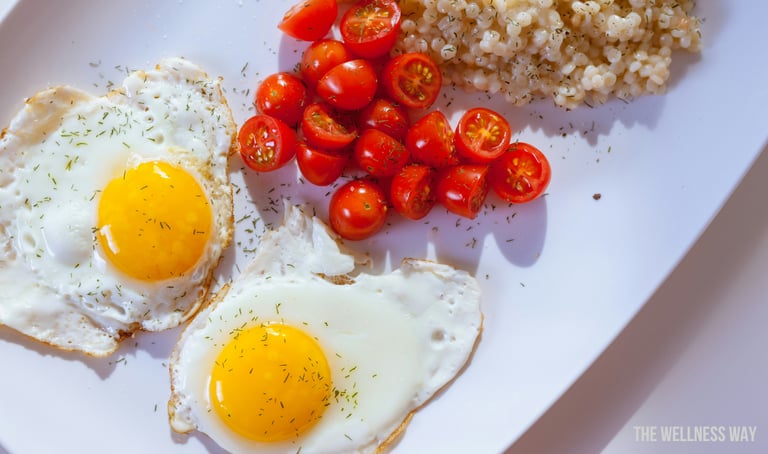Best High Protein Foods for Muscle Growth (Top 10 Foods Backed by Science)
NUTRITIONFEATURED


Best High-Protein Foods for Muscle Growth (Top 10 Foods Backed by Science)
Building muscle isn’t just about lifting heavy weights it’s also about fueling your body with the right nutrition. Protein is the most important macronutrient for muscle repair and growth. If you’re working out consistently but not eating enough protein, you’re leaving gains on the table.
In this article, we’ll cover the best high protein foods for muscle growth, how much protein you actually need, and practical tips to include them in your daily diet.
Why Protein is Essential for Muscle Growth
Muscle repair & recovery → Protein provides amino acids that repair muscle tissue after training.
Increased strength → Higher protein intake supports strength and lean mass gains.
Boosts metabolism → Protein-rich foods increase thermogenesis, helping burn more calories.
Satiety & fat loss → Protein keeps you full longer, reducing cravings.
Top 10 High-Protein Foods for Muscle Growth
1. Chicken Breast
Protein per 100g: ~31g
Lean, versatile, and affordable.
Perfect for meal prep—grilled, baked, or added to salads.
2. Eggs
Protein per egg: ~6g
Rich in leucine, the key amino acid for muscle building.
Eat whole eggs for extra vitamins & healthy fats.
3. Greek Yogurt
Protein per 200g: ~20g
Higher in protein than regular yogurt.
Contains casein protein, which digests slowly—perfect before bed.
4. Paneer
Protein per 100g: ~14g
Excellent vegetarian protein source.
Rich in calcium for strong bones & muscle recovery.
5. Lentils & Beans
Protein per 100g (cooked): 9–12g
Great plant-based protein with added fiber.
Helps in digestion and gut health.
6. Fish (Salmon, Tuna, Mackerel)
Protein per 100g: 20–25g
Packed with omega-3 fatty acids, which reduce muscle soreness & inflammation.
7. Whey Protein Powder?
Protein per scoop (~30g): 22–25g
Fast-digesting → best post-workout.
Backed by research as the most effective protein supplement.
8. Quinoa
Protein per 100g (cooked): ~4g
A complete plant protein (all essential amino acids).
Combines carbs + protein = perfect for athletes.
9. Lean Beef
Protein per 100g: ~26g
High in iron, zinc, and creatine → supports strength training.
10. Tofu & Tempeh
Protein per 100g: 8–19g
Vegan-friendly and versatile in stir-fries, curries, and salads.
How Much Protein Do You Need?
Recommended intake: 1.6–2.2g protein per kg of body weight daily.
Example: A 70kg person needs 112–154g protein/day.
Spread intake across 3–5 meals for maximum muscle growth.
Tips to Maximize Protein Intake
Add protein to every meal (eggs for breakfast, chicken/fish for lunch, lentils for dinner).
Snack smart → Greek yogurt, protein bars, or boiled eggs.
Combine plant & animal proteins for a balanced amino acid profile.
Use whey/casein protein supplements if you struggle to meet daily targets.
FAQs
Q1: Can vegetarians build muscle without meat?
✅ Yes. Paneer, tofu, quinoa, lentils, and soy are excellent vegetarian protein sources.
Q2: Is whey protein safe for daily use?
✅ Yes, whey is one of the most researched and safe supplements for muscle growth.
Q3: What’s better whole food or protein powder?
Whole foods should form your foundation. Use whey protein only for convenience and post-workout recovery.
Eating enough high-protein foods is just as important as training when it comes to muscle growth. Whether you prefer chicken, eggs, paneer, or plant-based sources, the key is consistency. Aim for 1.6–2.2g protein/kg bodyweight, spread throughout the day, and combine it with regular strength training
Start today by adding 2–3 protein-rich foods from this list to every meal, and watch your gains accelerate!
Looking for more health & fitness content? Explore my other blogs on diet, workouts, and lifestyle to reach your goals faster.
Related Stories
Subscribe to our newsletter
Enjoy exclusive special deals available only to our subscribers.